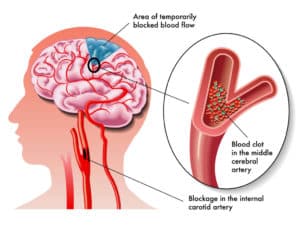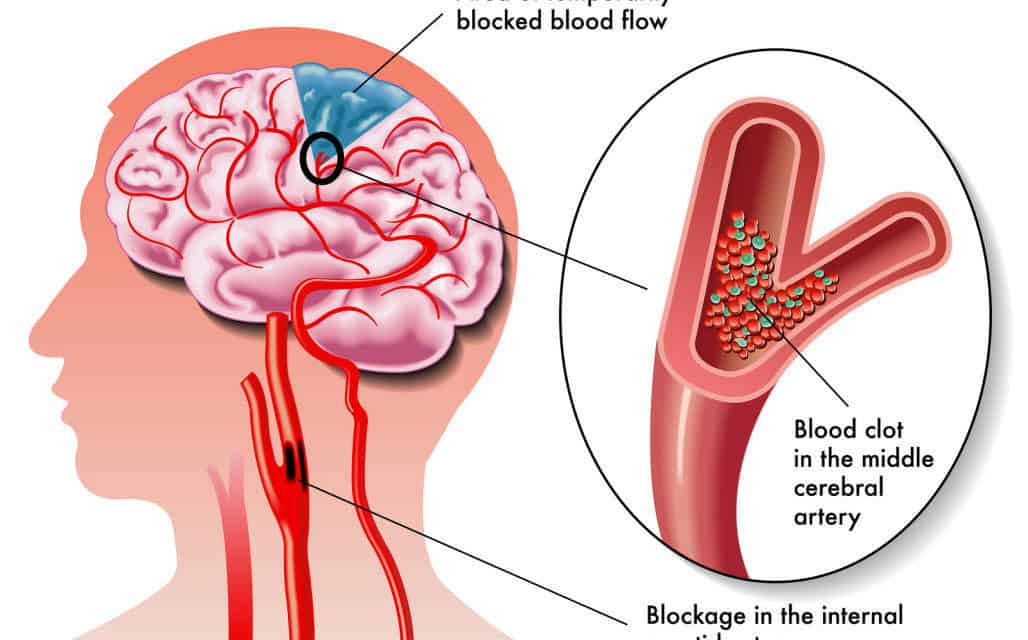TRANSIENT ISCHEMIC ATTACK (TIA) – A Mini-Stroke Can Lead to a Full-Blown Stroke
By Richard Barlupi, Volunteer Educator National Stroke Association
Having a stroke can be a life-changing event. In addition to impacting your health, the effects can be equally devastating to your family, friends and finances.
 What is a Stroke? Stroke is a disease that affects the arteries leading to and within the brain. It is the No. 3 cause of death in the United States, behind diseases of the heart and cancer. Over 800, 000 Americans this year will have a stroke; over 240,000 will be a TIA stroke or mini-stroke. A stroke or “brain attack” occurs when a blood vessel that carries oxygen and nutrients to the brain is either blocked by a clot or bursts. When that happens, part of the brain cannot get the blood and oxygen it needs, so it starts to die.
What is a Stroke? Stroke is a disease that affects the arteries leading to and within the brain. It is the No. 3 cause of death in the United States, behind diseases of the heart and cancer. Over 800, 000 Americans this year will have a stroke; over 240,000 will be a TIA stroke or mini-stroke. A stroke or “brain attack” occurs when a blood vessel that carries oxygen and nutrients to the brain is either blocked by a clot or bursts. When that happens, part of the brain cannot get the blood and oxygen it needs, so it starts to die.
While the vast majority of strokes are not preceded by a TIA, about a third of people who experience a TIA go on to have a full-fledged stroke within a year. “TIA is a warning stroke and gives a patient time to act and keep a permanent stroke from occurring,” Dr. Matarese said, director of a primary stroke center at St. Mary’s Medical Center in Langhorne, Pa . “By recognizing TIA symptoms and getting to the hospital immediately, the patient can get help in identifying why the TIA occurred and get treatment — either through medication or surgery — that can prevent a full blown stroke from occurring.”
The most promising treatment for an ischemic stroke (TIA) is the FDA-approved clot-busting drug TPA (tissue plasminogen activator), which must be administered within a three-hour window from the onset of symptoms. Administering TPA or other clot-dissolving agents is complex and is done through an intravenous (IV) line in the arm by hospital personnel. If given promptly, TPA will significantly reduce severe permanent disability. Unfortunately, only a small percentage of those who suffer a TIA stroke reach the hospital within the three-hour window to be considered for this treatment .
Did you know? About half of all people who have a TIA don’t report it to their doctors. This may have serious consequences, so it is extremely important to recognize TIA symptoms and seek immediate medical attention. Learn the many warning signs of a stroke. You could save your life or the life of a loved one. Strokestrikes fast. You should too. Remember: Time lost is brain lost, every minute counts.
Act F.A.S.T. and CALL 9-1-1 IMMEDIATELY at any sign of a stroke. Use the F.A.S.T. test to remember and recognize the warning signs of a stroke.
F = FACE Ask the person to smile. Does one side of the face droop?
A = ARMS Ask the person to raise both arms. Does one arm drift downward?
S = SPEECH Ask the person to repeat a simple sentence. Does the speech sound slurred or strange?
T = TIME If you observe any of these signs, it’s time to call 9-1-1 or get to the nearest stroke center or hospital right away.
For additional information contact the National Stroke Association at :
www.stroke.org or 1-800-STROKES












